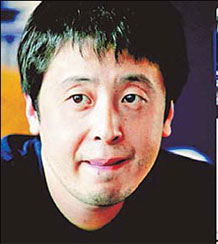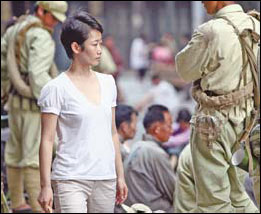I Wish I Knew records history's turning points
By Wang Kaihao and Xu Wei (China Daily)
Updated: 2010-10-27 09:40
 |
Large Medium Small |
Jia Zhangke, one of the most outstanding of China's sixth generation filmmakers, has just added another feather to his cap.
His latest documentary, I Wish I Knew, has won him the Halekulani Golde
n Orchid Award for Best Documentary at the 30th Hawaiian International Film Festival (HIFF).
 |
|
Director Jia Zhangke is passionate about independent filmmaking. Photos Provided to China Daily |
I Wish I Knew records the changes in Shanghai since the 1930s through the narratives of 18 different figures.
"A city cannot forget its past. When faced with the turning points of history, we must record the narratives of its witnesses," Jia says.
"I like to reflect on the lives of ordinary individuals amid the earthshaking changes in Chinese society."
Jia showed not just his new film at HIFF but also his two best-known fictional works, The Pickpocket (1997) and Still Life (2006).
At a panel discussion during the festival, Ji said, "I never let the box office influence my passion for films as the cultural influence of a film does not lie in its box office but in the response it evokes.
"Filmmaking for me is not a short period of delusion but the unfolding of the focus on the less privileged groups of society."
Jia says he was surprised and touched when several chefs from a Chinese restaurant in Los Angeles told him they liked Still Life.
Influenced by Italian art filmmakers such as Michelangelo Antonioni and Federico Fellini, Jia's films usually leave room for the audience to step in with their imagination.
"The audience is not passive. Andr Bazin (influential French film critic) once said there should be a void in the film for the audience to fill with their emotion. The film is a channel for audience and directors to interact," Jia says.
 |
|
Actress Zhao Tao plays the lead in I Wish I Knew. |
The director reveals that it was this lack of interaction in Chinese films that pushed him toward independent filmmaking, while at the Beijing Film Academy.
He says that only independent filmmaking can capture China's staggering transformation.
"If I had waited for the approval of the authorities, I would have had to wait for the whole of Fengjie City to be submerged before completing Still Life," he says.
Jia took only 10 days to decide to shoot this film after his first visit to the Three Gorges dam in the summer of 2005, to prepare for another film.
"I was shocked by the scale of the migration. It felt surreal. I immediately decided to record it."
In February, Jia will begin shooting his first martial arts film, In the Qing Dynasty. It is a story about people from different social strata in a county, set in the 1900s.
"The late Qing Dynasty (1644-1911), in my view, is the beginning of Chinese modernization and an epoch of huge change," he says.